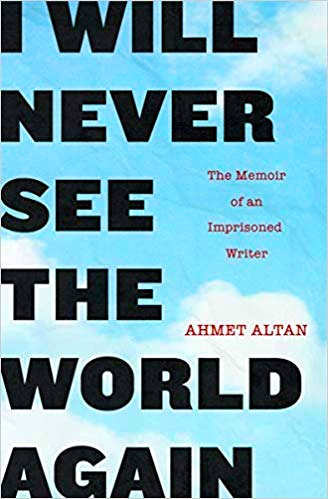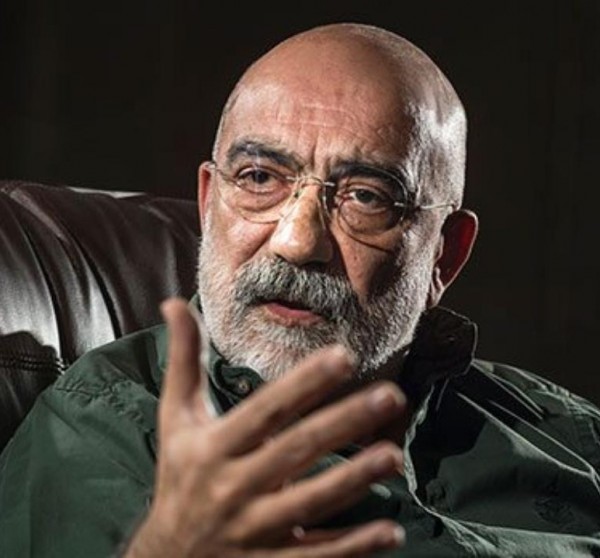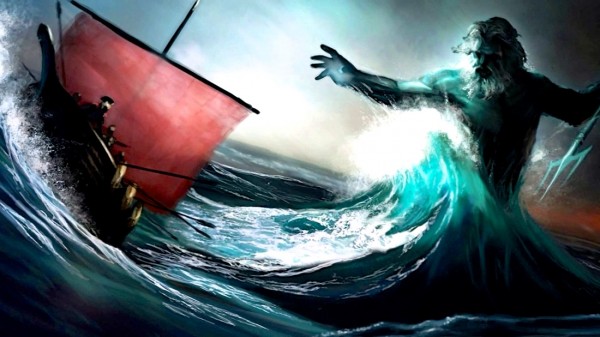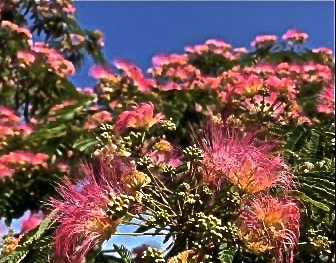“I am a writer. I am neither where I am nor where I am not….Each eye that reads what I have written, each voice that repeats my name holds my hand like a little cloud and flies me over the lowlands, the springs, the forests, the seas, the towns and their streets. They host me quietly in their houses, in their halls, in their rooms. I travel the whole world in a prison cell…but I am not in prison….Like all writers I have magic. I can pass through your walls with ease.”
 I Will Never See the World Again by Ahmet Altan, written from a cell in Turkey where the author has been imprisoned for the past three years, is a memoir so astonishing in its description of his prison life and so remarkable for its revelations of Altan’s good-humored emotional state that I cannot imagine anyone not rejoicing in the publication of this book. While that reaction may seem absurd on its surface and oddly romantic in its vision of reality, as seen in the opening quotation, the author has had three years to come to terms with his arrest and figure out ways to survive – and even benefit from it, hard as that may be to believe. Sharing observations from literature and philosophy in which he sees parallels to his prison life, he connects with the reader in a broader, more universal, and peaceful way than most readers will expect. He elevates his narrative above the sometimes horrific details of prison life, putting them aside by looking instead for ways to benefit from the challenges. While this may make the book sound like a religious or philosophical tract about achieving inner peace, exploring reality, or finding God, Altan’s vision is so eclectic and so thoughtful that readers from around the world will find much to understand, admire, and even love here, regardless of their own culture or life experience.
I Will Never See the World Again by Ahmet Altan, written from a cell in Turkey where the author has been imprisoned for the past three years, is a memoir so astonishing in its description of his prison life and so remarkable for its revelations of Altan’s good-humored emotional state that I cannot imagine anyone not rejoicing in the publication of this book. While that reaction may seem absurd on its surface and oddly romantic in its vision of reality, as seen in the opening quotation, the author has had three years to come to terms with his arrest and figure out ways to survive – and even benefit from it, hard as that may be to believe. Sharing observations from literature and philosophy in which he sees parallels to his prison life, he connects with the reader in a broader, more universal, and peaceful way than most readers will expect. He elevates his narrative above the sometimes horrific details of prison life, putting them aside by looking instead for ways to benefit from the challenges. While this may make the book sound like a religious or philosophical tract about achieving inner peace, exploring reality, or finding God, Altan’s vision is so eclectic and so thoughtful that readers from around the world will find much to understand, admire, and even love here, regardless of their own culture or life experience.
Philippe Sands, from London, an attorney and friend representing Altan and his brother in the European Court of Human Rights in Strasbourg, writes the Foreword and confirms Altan’s resilience. When Sands finally gets a chance to interview him in his prison, Sands says that they “spent most of our thirty minutes roaring with laughter.” As Altan says, “We [Turks] are a nation of bungee jumpers, and just before we hit ground, we somehow manage to bounce up again.” As for his book, Altan comments, drily, that prison is or should be “a rite of passage for any writer.” As Sands leaves the prison cell at the end of their meeting, he marvels that “it was quite something to spend a little time with a man sentenced to spend the rest of his life in prison…and something else to leave the prison cell with “an unexpected feeling of elation, motivated by the sheer towering greatness of Ahmet Altan and the human spirit.”
The surprising good humor continues in the opening chapter, “A Single Sentence,” as the police arrive at Altan’s house, cart away his computers, and put him in the car for the trip to prison. On the way, one of the policemen offers him a cigarette, and Altan replies, “I only smoke when I am nervous,” a reply that comes so automatically it surprises even Altan himself. That single sentence, he says, “divided reality in two….On one side of the reality was a body made of flesh, bone, muscle and nerve that was trapped. On the other side was a mind that did not care about that body and made fun of what would happen to it, a mind that looked from above at what was happening and at what was yet to happen, that believed itself untouchable and that was, therefore, untouchable.” He sees himself as being like Julius Caesar who built one high wall around a castle that he and his troops had besieged, preventing those inside from escaping, and another high wall around his troops, preventing them from entering.
Each of the chapters that follows concentrates on a single image or theme related to Altan’s imprisonment. In “The First Night in the Cage,” Altan suffers mightily from claustrophobia but knows that he “will survive by hanging on to the branches of [his] own mind…and not giving in…even for a moment.” And when, finally exhausted, he reads the thoughts of St. Augustine in a book that he has brought with him, he is furious that Augustine blames all evil on Adam, asking “What is the bigger sin, a man eating an apple or punishing all of humanity with torture because a man ate an apple?” The next chapter “The Mirror and the Doctor,” comments on the fact that there are no mirrors in prison, a way by which “they had erased us from life.” Then he thinks of Narcissus and the pool in a story by Oscar Wilde in which, when Narcissus dies, the pool itself misses Narcissus because “in the mirror of his eyes I saw my own beauty mirrored – even a pool wants to look at itself.”
“The Teacher,” the story of one of Altan’s two cellmates, reminds Altan of “An Essay on Venice” by Joseph Brodsky, who says that the smell of frozen seaweed in wintertime Venice was synonymous with happiness for him, and Altan is astonished that “a smell completely unknown to me made him think of ‘absolute happiness.’ ” In “Voyage Around My Cell,” Altan recalls loving O. Henry’s work as a child, then discovering Xavier de Maistre’s “Voyage Around My Room,” which he liked even better. He concludes that “Forgetting is the greatest source of freedom a person can have,” and that the act of writing “harbors a magical paradox…It enables you. Not only to forget but also to be remembered.” As he walks around his cell, as de Maistre did his room, he realizes that “There is a cure for everything. Except longing,” and he sees that the creativity his cellmates and others show by using the prison bulletin board to highlight pictures of mimosas, kumquat trees, and “flowers of light,” offers much which helps heal the soul – the imagined smell of their blossoms, the rustle of their branches, and the coolness of the wind.”
The writings of Plato, Tolstoy, Murakami, Saramago, Dante, Arthur Miller, Robert Musil, and Boris Pasternak appear in later stories as Altan continues to recall books that he has loved and lived. He thinks of himself as Odysseus fighting Poseidon, appreciating that “there was the storm and there was me. We were going to fight.” Ultimately, as he thinks of all that he cannot do in prison, he also realizes that what he cannot do is not the whole truth. He sometimes wakes up feeling that he still resides in the pavilion with a garden where he spent his childhood, and in autumn when the rain hits the window bars, he sometimes thinks of being in a hotel on the shores of the Danube. “I have never woken up in prison – not once.” His dream adventures come from all over the world, and he is happy, possessing “a godly arrogance. I am not in prison. I am a writer…[and] like all writers, I have magic.” An extraordinary memoir by an extraordinary man.
ALSO by Ahmet Altan: ENDGAME
Photos. The author photo appears on https://pen.org
Julius Caesar, with whom the author sees some resemblances, is from https://sites.google.com/a/pvlearners.net
The detail from the John William Waterhouse painting of Narcissus (1903) may be found at https://www.psychologytoday.com
Venice in the winter had sense impressions which Joseph Brodsky identified with pure happiness. https://www.explo-re.com
The author sees himself as Odysseus challenging Poseidon: https://joserosasirbp.weebly.com
Photos of natural beauty, like mimosa trees, on the prison bulletin board helped to heal the soul, according to the author. https://commons.wikimedia.org






